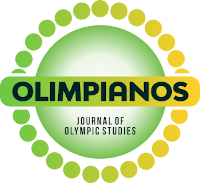Artificial intelligence applied to personality analysis of Brazilian Olympic athletes using artificial neural networks
DOI:
https://doi.org/10.30937/2526-6314.v5.id138Keywords:
Personality, Psychological Assessment, Sport Psychology, Neural networks, Artificial IntelligenceAbstract
We are experiencing an exponential technological advance, especially in the application of Artificial Intelligence, more specifically in natural language techniques, contributing to the development of post-modern methods for investigating personality. At the same time, the athlete's oral history is considered an important source of knowledge construction about him, as it can reflect experiences actively lived by this subject, which transcends the objective aspect, being in a constant process of resignification, either by the imagination popular, or by the cultural industry. This research is a development phase of a methodology for extracting information and knowledge, from the narrative of Brazilian Olympic athletes in interviews, submitted to analysis via Neural Networks. The research hypothesis is that it is possible to identify characteristics associated with personality traits, through the application of analyzes via Neural Networks, for the automatic extraction of knowledge and information via association of descriptor terms and phrases of the empirical model of the five great factors of personality present in the literature. It is suggested that, once the automatic method of extracting information and knowledge is defined, investigate in a much larger number of athletes, either in the same or in different sports modalities. With this study, interesting relationships were verified between sentences that appear in the athletes' narratives, in relation to personality traits. It is expected that this work will contribute to the continuity of studies with Neural Networks, for the investigation of personality traits.
Downloads
References
Aggarwal CC, Zhai C. Mining Text Data. New York (USA): Springer; 2012.
Rezende SO. Sistemas inteligentes: fundamentos e aplicações. São Paulo: Manole; 2003.
Sinoara RA, Camacho-Collados J, Rossi RG, Navigli R, Rezende SO. Knowledge-enhanced document embeddings for text classification. Knowledge-Based Systems. 2019;163: 955-971. DOI: doi.org/10.1016/j.knosys.2018.10.026
Marcacini RM, Rossi RG, Matsuno IP, Rezende SO. Cross-domain aspect extraction for sentiment analysis: A transductive learning approach. Decision Support Systems. 2018;114: 70-80. DOI: doi.org/10.1016/j.dss.2018.08.009
Sinoara RA., Antunes J, Rezende SO. Text mining and semantics: a systematic mapping study. Journal of the Brazilian Computer Society. 2017;23(1): 1-20. DOI: doi.org/10.1186/s13173-017-0058-7
Rodríguez MM, Bezerra BLD. Processamento de linguagem natural para reconhecimento de entidades nomeadas em textos jurídicos de atos administrativos (portarias). Revista de Engenharia e Pesquisa Aplicada. 2020;5(1): 67-77. DOI: doi.org/10.25286/repa.v5i1.1204
Bulegon H, Moro CMC. Mineração de texto e o processamento de linguagem natural em sumários de alta hospitalar. Journal of Health Informatics. 2010;2(2): 51-56.
Allport GW. Traits revisited. American Psychologist. 1966;21: 1–10.
Digman JM. Historical antecedents of the five-factor model. In: Costa PT, Widiger TA (Eds.), Personality disorders and the five-factor model of personality. Washington, DC: American Psychological Association. 2002. p. 17-22.
Rabelo IS. Investigação de traços de personalidade em atletas brasileiros: análise da adequação de uma ferramenta de avaliação psicológica [tese). Escola de Educação Física e Esporte. São Paulo: Universidade de São Paulo; 2013.
Nunes CHSS, Hutz CS, Nunes MFO. Bateria fatorial de personalidade (BFP): manual técnico. São Paulo: Casa do Psicólogo; 2010.
Goldberg LR. The development of markers for the Big-Five factor structure. Psychological Assessment. 1992;4: 26-42.
Hutz CS, Nunes CH, Silveira AD, Serra J, Anton M, Wieczorek LS. O desenvolvimento de marcadores para a avaliação da personalidade no modelo dos cinco grandes fatores. Psicologia: Reflexão e Crítica 1998;11(2): 395-411.
McCrae RR, John OP. An introduction to the Five-Factor Model and its applications. Journal of Personality. 1992;60(2): 175-215.
Saucier G. Mini-Markers: A brief version of Goldberg’s unipolar Big-Five markers. Journal of Personality Assessment 1994;63: 506-516.
Rubio, K. O Atleta e o mito do herói. São Paulo: Casa do Psicólogo; 2001.
Aranha CN. Uma abordagem de pré-processamento automático para mineração de textos em português: sob o enfoque da inteligência computacional [tese]. Pontifica Rio de Janeiro: Universidade Católica do Rio de Janeiro – PUC; 2007.
Rubio K, Rabelo IS, Sinoara RA, Barbosa RS, Rezende SO. Identificação de personalidade de atletas olímpicos: uma análise exploratória de narrativa com mineração de textos. Revista Brasileira de Psicologia do Esporte. 2019;9(2): 145-163.
Rabelo IS., Rubio K. Literatura científica sobre a mineração de textos aplicada à identificação da personalidade de atletas. Olimpianos – Journal of Olympic Studies. 2018;2(1): 274-303. DOI:10.30937/2526-6314.v2n1.id37
Rubio K, Rabelo IS, Cruz RM. Avaliação de aspectos psicológicos em Educação Física e Esporte. In: Böhme MTS (org). Avaliação e desempenho em Educação Física e Esporte. São Paulo: Editora Manole; 2018.
Bininda-Emonds ORP, Jones KE, Price AS, Cardillo M, Grenyer R, Purvis A. Garbage in, Garbage out. In: Bininda-Emonds ORP (eds) Phylogenetic Supertrees. Computational Biology. New York (USA): Springer, Dordrecht; 2004.
Buolamwini J. How I'm fighting bias in algorithms [citado 18 fev. 2019]. 2017 Disponível em: https://www.ted.com/talks/joy_buolamwini_how_i_m_fighting_bias_in_algorithms.
Downloads
Published
Issue
Section
License
The authors authorize others to copy and redistribute the material in any medium or format. Remix, transform, and create from the material. You may not use the material for commercial purposes.






